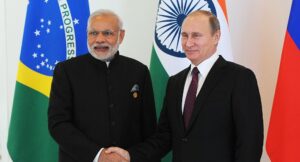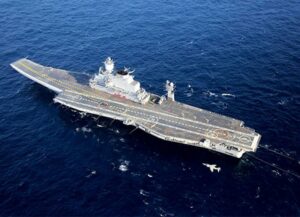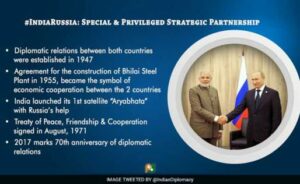International Relations: Where India-Russia relations stand today: Article Analysis
Where India-Russia relations stand today: Article Analysis

Prime Minister Narendra Modi and Russian President Vladimir Putin met in New Delhi for the 19th India-Russia annual bilateral summit during which they will deliberate on a host of bilateral, regional and global issues. The summit began at Hyderabad .
Mains: GS-2
Bilateral, regional and global groupings and agreements involving India and/or affecting India’s interests
Indo Russia Energy Sector cooperation
- Nuclear energy is one of the key focus of the focus area of India Russia strategic partnership.it has assisted Russia achieve monopoly in India’s nuclear market.
- The Kudankulam Nuclear Power Plant (KNPP) has become one of the biggest success stories of India-Russia cooperation.
- During the 15th Annual Summit, India and Russia agreed to build 12 new nuclear plants. India, Russia and Bangladesh also signed a trilateral agreement in March, 2018, for the construction of a NPP in Rooppur, Bangladesh.
- As part of India’s new energy sourcing strategy, the first LNG cargo -under the long-term contract between GAIL and Gazprom Marketing & Trading Singapore (GMTS) of Russia — arrived at the Dahej LNG Terminal in Gujarat in June, 2018.
- The two countries also strive to bring in, together, energy regimes in Eurasia — in which Iran is an integral part, given its strategic location and the projects undertaken by India, such as the Chahbahar Port.
Indo Russia Economic Cooperation
- Russian Foreign Minister cited official statistics demonstrating 20 per cent growth in Russian-Indian trade in 2017. India’s participation as a guest country in St Petersburg International Economic Forum (SPIEF) in 2017 has manifested stronger economic cooperation between the two countries.
- India and Russia are the only partners to have inter-governmental commissions taking stock of the progress of bilateral cooperation especially in the economic sphere. The India-Russia Inter-Governmental Commission on Technical & Economic Cooperation (IRIGC-TEC), for instance, is a standing body that annually meets and reviews ongoing activities of bilateral cooperation in the fields of trade and investment, science and technology, culture and other issues of mutual interest.
- To further expand the domain of economic cooperation, Eurasian integrity, regional cooperation, free trade agreements, connectivity and trade corridors have gained utmost importance in the annual bilateral summits.
- The International North South Transport Corridor and the Eurasian Economic Union, for instance, have emerged as immediate priority areas for strong economic cooperation between the two countries.
- The Russian Far-East is another region for potential economic engagement.
- India’s presence in the Eastern Economic Forum (EEF) is focused for developing an “energy bridge” including trade, commerce, and investment, railway infrastructure, steel plants, defence, space, ports and shipping.
- A key focus area could be exploring the prospects of attracting an agricultural workforce in the region, given India’s huge potential record in the agricultural sector. India, for instance, has been host to one of the largest farmers’ emigration to Canada, which too has a bleak climate such as the Russian Far-East.
- India is progressing towards strengthening its foothold in the Indo-Pacific region through a strategic partnership with the US, but the economic engagement with Russia in the region will further enhance its geo-economic interests overall.
Indo Russia Defence Cooperation
- India-Russia defence co-operation has achieved new capacities through acquisitions and joint development of weapons and military equipment, which include the induction of INS Vikramaditya, the launching of own IAC- INS Arihant and the successful development of BrahMos supersonic cruise missile to name a few.
INS Vikramaditya

- India still remains the largest client for Russian military equipment (69 per cent) and joint production initiatives.
- The finalising of the S-400 missile defence system agreement between India and Russia comes under the purview of the sanctions as Almaz-Antey Air and Space Defence Corporation, which makes the S-400 missile defence system face sanctions under the Act.
- Apart from India’s large dependence on Russia’s state-of-the-art weapons systems, India’s predictable resistance to external pressures, especially the US, is based on two core factors — a) its strategic autonomy is being challenged and b) Russia’s rebirth as a military power in recent times is conducive to India’s interests and domestic initiatives such as the Make in India project.
Advocacy of multi polarity
- Both India and Russia are part of non-Western organisations such as SCO and BRICS which has gained geopolitical significance in recent years. Both India and Russia, along with other member states, strive towards the establishment of a bloc free geopolitical architecture.
- Through annual bilateral summits, the two countries have expressed their readiness to continue consultations and coordination in multi-polar global fora, such as the G-20, EAS and BRICS.
- Alongside, the strengthening of soft power quotient has gained prominence in the bilateral talks between India and Russia.
- In 2017, India agreed to provide an annual grant of $10,000 to fund the study of “Indology” at the Centre for Regional and International Studies at Far-East Federal University.
Conclusion

- Over the years, the partnership between the two countries has blossomed both at the bilateral and global level.
- However, in recent times, given the realities of the dynamism of international affairs, the progress of the partnership is not moving along as smoothly as desired. Some factors that have become a cause of concern in the partnership are the growing proximity between India and the US and Russia’s rapprochement with China and Pakistan in particular.
- In conclusion, today the interests and concerns of both India and Russia have nevertheless moved further towards a more “shared diversified” ones. But, despite the hiccups in relations, both Russia and India have maintained a durable partnership for decades, and share a long history, their relations being based on goodwill and friendship.
- So, both India and Russia will have to proceed very delicately while pursuing their individual foreign policy interests without “rocking the boat” and undermining each other’s grand strategy and national interests.
Source:Daily O website












